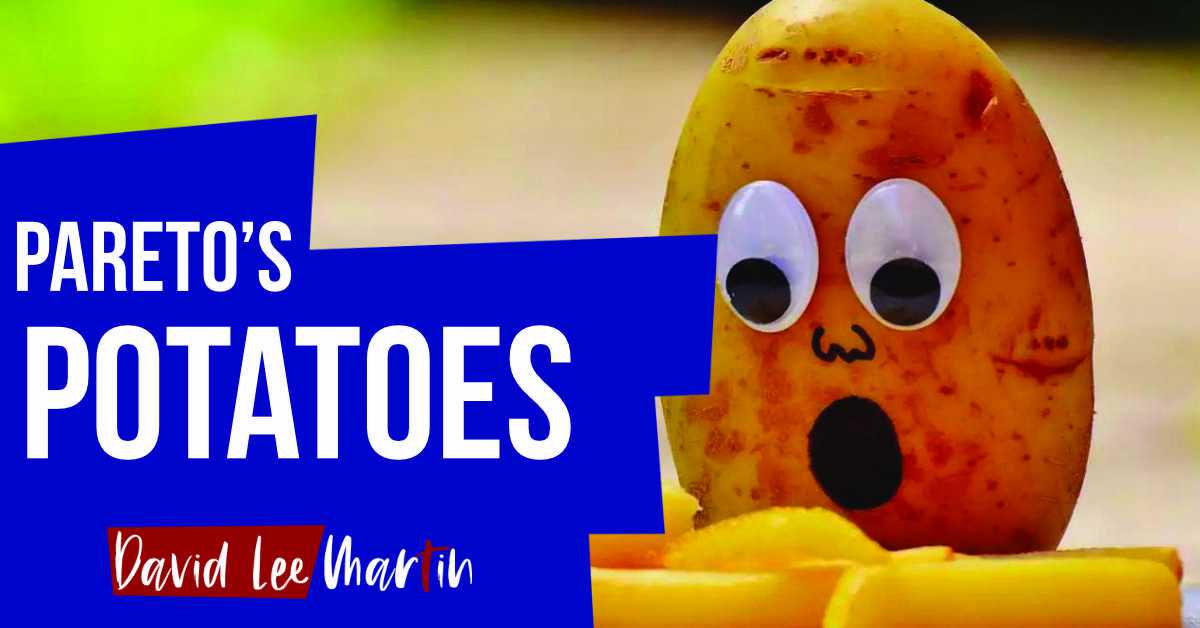A potato story.
The farmer went to his potato patch to sow.
Some seed was swallowed, some trodden underfoot, some strangled.
The seed that found its happy soil bore fruit, some 30, some 60, some a hundredfold.
How many potatoes the farmer harvested depended on which plot he plowed and populated. Some were significantly better than others.
So said the Master in Matthew 13.
So much can be said about this prime-cut parable.
I just want to point to one thing. Even the good ground yielded varied results.
If you knew that your efforts in one place bore more fruit than exactly the same effort expended elsewhere, what would you do?
The activities you engage in, the time and effort you sow, the investments you make in whatever realm of life, will give a range of outcomes. Sime will wither, but with wisdom, you can scout the ground and focus on the good, but even here your ROI (Return On Investment) will differ.
In walks Pareto.
Italian economist Vilfredo Pareto, while at the University of Lausanne in 1896, noted that approximately 80% of the land in Italy was owned by 20% of the population. This observation was then broadly applied and it was discovered that the math appears to work in almost any situation.
The Pareto principle, as it is now called, states that for many outcomes, roughly 80% of consequences come from 20% of the causes. Other names for this principle are the 80/20 rule or the law of the vital few.
20% of your efforts lead to 80% of your results.
A few vital tasks are responsible for the majority of your wins.
That leaves a whopping 80% of trivial expenditure giving only a 20% pay off.
The key here is to determine what your vital few activities are. You alone can determine how these numbers stack up in your specific situation. And a good yield is not always just the number of potatoes you have in your bag. Quality of life and depth of love and laughter are as much a part of your harvest, so choose carefully.
Let’s take an author business as an example.
It could be that you spend inordinate amounts of time engaged on social media pages, yet only a small portion of your sales directly result from those interactions.
Or perhaps you constantly beautify your author website. But does a beautiful website actually sell books? Only you would be able to answer that one. In my author business, the websites I develop are responsible for a minimum amount of traffic and sales compared to new-release books advertised directly on Amazon or through my email list. This weighting is not true for other aspects of my business, where the website is a key factor. The 80/20 rule works differently according to where it is applied.
Just be sure to honestly evaluate your own 80/20. It will not always be just the activities you enjoy that are the most vital to your success.
Learn to focus the lion’s portion of your time and attention on the activities that deliver 80 percent of your results, and slice the 20 percent yield activities to their minimum. Avoid being swallowed by inconsequentials.
Sometimes the simplest, most direct, and obvious activities, are the ones that give the biggest bang for buck. Complex systems often require so much energy and maintenance that the yield of effort to result is adversely affected.
Where are you tangled in complexity wrestling in the 20% result arena, rather than simplifying so the majority of your energies are poured into the 80% yield activities.
Who knew that Pareto and Potatoes had so much to teach us?
PS: I know potatoes don’t grow from seeds but potato pareto was just too good to pass



